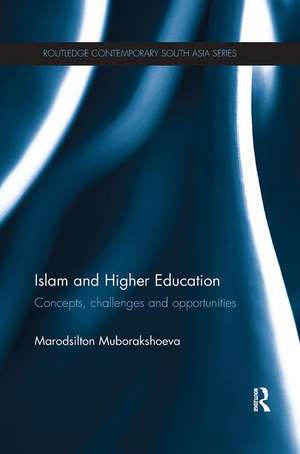Islam and Higher Education: Concepts, Challenges and Opportunities: Routledge Contemporary South Asia Series
Autor Marodsilton Muborakshoevaen Limba Engleză Paperback – 18 mai 2017
The book reviews the history of higher education institutions and examines opportunities for some Pakistani universities, to become centres of excellence in the future. This is subject to adequate support from the government, industries, philanthropists and the society at large. In return, these universities would have to cater to the needs of the society, from basic needs in the areas of health and education to science and technology.
Islam and Higher Education breaks new grounds in the field of higher education in Muslim contexts and will be of interest to researchers in the fields of comparative education and Islamic Studies.
Din seria Routledge Contemporary South Asia Series
-
 Preț: 393.91 lei
Preț: 393.91 lei -
 Preț: 310.08 lei
Preț: 310.08 lei - 8%
 Preț: 389.84 lei
Preț: 389.84 lei -
 Preț: 304.19 lei
Preț: 304.19 lei -
 Preț: 316.71 lei
Preț: 316.71 lei -
 Preț: 328.88 lei
Preț: 328.88 lei -
 Preț: 349.03 lei
Preț: 349.03 lei - 9%
 Preț: 1035.78 lei
Preț: 1035.78 lei - 18%
 Preț: 1056.00 lei
Preț: 1056.00 lei - 28%
 Preț: 848.40 lei
Preț: 848.40 lei - 18%
 Preț: 1059.48 lei
Preț: 1059.48 lei - 18%
 Preț: 1063.41 lei
Preț: 1063.41 lei - 18%
 Preț: 1060.87 lei
Preț: 1060.87 lei - 18%
 Preț: 1057.26 lei
Preț: 1057.26 lei - 18%
 Preț: 1057.75 lei
Preț: 1057.75 lei - 18%
 Preț: 1061.93 lei
Preț: 1061.93 lei - 18%
 Preț: 1057.05 lei
Preț: 1057.05 lei - 18%
 Preț: 1062.98 lei
Preț: 1062.98 lei - 18%
 Preț: 1049.21 lei
Preț: 1049.21 lei - 18%
 Preț: 1058.79 lei
Preț: 1058.79 lei - 18%
 Preț: 1057.09 lei
Preț: 1057.09 lei - 18%
 Preț: 705.87 lei
Preț: 705.87 lei - 18%
 Preț: 1054.97 lei
Preț: 1054.97 lei - 18%
 Preț: 1109.42 lei
Preț: 1109.42 lei - 28%
 Preț: 823.63 lei
Preț: 823.63 lei - 18%
 Preț: 1169.78 lei
Preț: 1169.78 lei - 30%
 Preț: 846.42 lei
Preț: 846.42 lei - 18%
 Preț: 1054.71 lei
Preț: 1054.71 lei - 18%
 Preț: 1057.75 lei
Preț: 1057.75 lei - 18%
 Preț: 1062.98 lei
Preț: 1062.98 lei - 28%
 Preț: 822.36 lei
Preț: 822.36 lei - 28%
 Preț: 848.15 lei
Preț: 848.15 lei - 18%
 Preț: 1053.92 lei
Preț: 1053.92 lei - 18%
 Preț: 698.58 lei
Preț: 698.58 lei - 18%
 Preț: 1058.79 lei
Preț: 1058.79 lei - 18%
 Preț: 1062.98 lei
Preț: 1062.98 lei - 18%
 Preț: 1057.75 lei
Preț: 1057.75 lei - 18%
 Preț: 1060.87 lei
Preț: 1060.87 lei - 18%
 Preț: 1057.40 lei
Preț: 1057.40 lei - 18%
 Preț: 1057.13 lei
Preț: 1057.13 lei - 18%
 Preț: 1165.87 lei
Preț: 1165.87 lei - 25%
 Preț: 823.63 lei
Preț: 823.63 lei - 18%
 Preț: 1059.48 lei
Preț: 1059.48 lei -
 Preț: 378.43 lei
Preț: 378.43 lei - 18%
 Preț: 1055.51 lei
Preț: 1055.51 lei - 18%
 Preț: 1057.75 lei
Preț: 1057.75 lei - 18%
 Preț: 1227.38 lei
Preț: 1227.38 lei - 28%
 Preț: 850.37 lei
Preț: 850.37 lei - 18%
 Preț: 1166.01 lei
Preț: 1166.01 lei
Preț: 299.52 lei
Preț vechi: 341.57 lei
-12% Nou
Puncte Express: 449
Preț estimativ în valută:
57.33€ • 62.30$ • 48.19£
57.33€ • 62.30$ • 48.19£
Carte tipărită la comandă
Livrare economică 21 aprilie-05 mai
Preluare comenzi: 021 569.72.76
Specificații
ISBN-13: 9781138086920
ISBN-10: 1138086924
Pagini: 200
Ilustrații: 10
Dimensiuni: 156 x 234 mm
Greutate: 0.45 kg
Ediția:1
Editura: Taylor & Francis
Colecția Routledge
Seria Routledge Contemporary South Asia Series
Locul publicării:Oxford, United Kingdom
ISBN-10: 1138086924
Pagini: 200
Ilustrații: 10
Dimensiuni: 156 x 234 mm
Greutate: 0.45 kg
Ediția:1
Editura: Taylor & Francis
Colecția Routledge
Seria Routledge Contemporary South Asia Series
Locul publicării:Oxford, United Kingdom
Public țintă
Postgraduate and UndergraduateCuprins
Introduction 1. Higher Learning in Muslim Contexts: The Past and Present 2. Modern Developments of Higher Education in Muslim Contexts 3. Ideas of 'a University': Key Conceptual Issues and Challenges 4. Concepts of ‘a University’ in Pakistan 5. The Cases of Universities Visited 6. Challenges Universities in Pakistan Face Conclusion
Recenzii
[…] This book responds to recent developments and debates in order to foster an awareness that is both beneficial and illuminating to the higher education community […] Presenting diverse and often competing views on all aspects of higher learning, this book will be a good reference tool for students and scholars of political science, Islamic studies, South Asian studies, comparative education, and culture and society. The volume gives insight into an ongoing process that is often regarded as "complete" in Europe and in the United States of America and provides a model for (developing) Muslim nations elsewhere to adopt and follow. Overall, the book offers the reader a good resource that serves as a reference for scholars interested in education and the politics of education. Its chapter separation works well to offer the reader a simple guide to follow, with information relatively easy to find. The book will serve students from different backgrounds as well as help researchers with case studies on Pakistan, education and Islamic studies.
Laurens de Rooij
Durham University
Journal of International and Global Studies Vol 6, No 2 April 2015
Laurens de Rooij
Durham University
Journal of International and Global Studies Vol 6, No 2 April 2015
Descriere
This book explores the different concepts of ‘a university’ and the way they shape practice in Muslim contexts, with a particular focus on the Islamic republic of Pakistan. Higher education in Muslim contexts is often criticised for being incapable either of contributing to the socio-cultural and civilisational developments of society or of doing research and producing knowledge of a high standard. While the international organisations accuse universities of not helping the societies to become knowledge based and to compete at the global level, some Muslim scholars call for the creation of ‘authentic Islamic’ educational structures that would, as they think, solve the problems of higher education.
